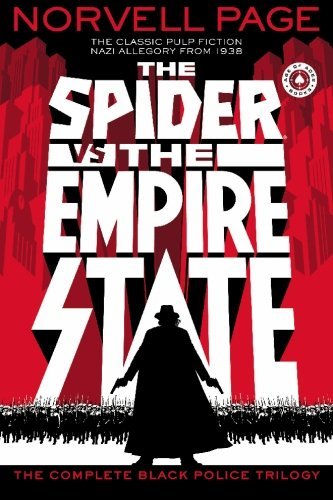It’s a weird quirk of life that art and artists often seem to anticipate the future with startling accuracy. Perhaps the most bizarre is the story Futility: or the Wreck of the Titan, by Morgan Robertson, written 14 years before the wreck of the Titanic yet eery in its details. Mental Floss has a good summary if you’re not familiar. There are other examples, too. If you want a really wild one, check out the Donald Trump Time Travel Conspiracy, with its roots in a novel from the 1890’s.
That one’s a doozy!
As I mentioned a few weeks ago, I recently got my hands on The Spider VS. The Empire State, a three-novel collection by Norvell Page written in 1938. It too is seemingly prophetic, though no one but me has noticed. Yet. In throes of the Great Depression, there was a growing sense that the republican form of government wasn’t adequate to solving the nation’s problems. Some (according to the book’s introduction), mostly conservatives, were arguing a dictator might be just what we needed. At the same time, Americans were wondering how anyone as evil as Hitler could rise to power in Germany. Meanwhile in their own backyard Louisiana governor Huey Long was setting up his own fiefdom.
Look around Twitter for a few minutes today and you’ll find plenty of support for King Trump.
In the opening of The City that Paid to Die, a new political party, “The Party of Justice,” swept the last election. While the branding is good, Richard Wentworth (aka: the masked vigilante, The Spider) knows that it’s just a facade for organized crime. He perceives that the new governor of New York is just a puppet and quickly finds out that a shadow figure known only as The Master is pulling the strings.
You can’t oppose The Party of Justice any more than Black Lives Matter without sounding like a bigot. And a weak-minded, puppet political leader? That’s crazy talk.
One of the first things The Master does is empty the prisons and enlist the inmates as his Black Police (which could only happen in Russia, right?), who collect taxes like mobsters take protection money. After the people have been taxed to death and suffering, the government sets up a social credit system, where anyone who donates to the “Save-a-Life Relief Fund” gets a purple cross with their donation amount stamped on the back. Anyone not properly signaling their virtue will be persecuted, no doubt.
Don’t forget to wear your mask and social distance, or you want Granny dead.
Speaking of social distancing, The next book, The Spider at Bay, sees The Master unleashing a plague to discourage opposition. Yeah, a plague. Not only that, it’s a sort of leprosy which keeps the populace in fear and anyone who has it is shunned for health and political reasons. The government controls the vaccine, but The Spider is able to secure the cure, thwarting them once again.
Sound familiar?
Naturally, the federal government is unable to get involved because this is what the people voted for in a fair and honest election. Wentworth goes to Washington and breaks into the White House(!) to ask the president for help, and even runs for governor in the next election. But it’s stolen from him in a second fair and honest election, and a warrant is put out for his arrest.
No comment.
As things continue to deteriorate in New York, what with the public executions, internment camps, and so forth, The Master decides a distraction is required. At this point he could have wrecked a train full of toxic chemicals in Ohio and I wouldn’t have been surprised, but instead he bombs a dam in neighboring Pennsylvania to the same effect.
Spoiler: In the end The Spider wins.
I loved these stories for their slam-bang, breathless action. And it shouldn’t have to be said that this is about as “America! F-Yeah!” as Norvell Page could get at the time. Guns are essential. Liberty is everything. There’s an amazing scene where The Spider leads a town into the fray and they spontaneously burst into “The Battle Hymn of the Republic.”
It’s like Batman meets Braveheart!
In the final story, Scourge of the Black Legions, The Spider discovers (SPOILER!) that the man who controls the technology is The Master. Shocking. While The Spider is able to use this new tech against The Master, he’s only successful because he taps into the citizens' American values and builds a culture that can’t help but celebrate and defend them. As The Mandalorian would say, “This is the way.”
Was Norvell Page a sage?
Not really. There are only so many ways that things can be done, but in the limitless reaches of the human imagination anything can happen. History repeats itself because people never change, and as long as artists pursue truth every so often they’ll appear to predict the future. Which is clearly what happened here. Now we need to ask, if Page was right about the development of the problem, might he also be right about the solution?
I think yes.

























